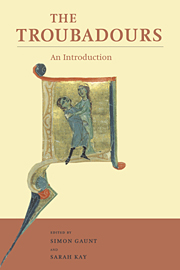Book contents
- Frontmatter
- Contents
- List of contributors
- Preface
- Map of Occitania and neighbouring Catalonia
- Introduction
- 1 Courtly culture in medieval Occitania
- 2 Fin'amor and the development of the courtly canso
- 3 Moral and satirical poetry
- 4 The early troubadours: Guilhem IX to Bernart de Ventadorn
- 5 The classical period: from Raimbaut d'Aurenga to Arnaut Daniel
- 6 The later troubadours
- 7 The trobairitz
- 8 Italian and Catalan troubadours
- 9 Music and versification
- 10 Rhetoric and hermeneutics
- 11 Intertextuality and dialogism in the troubadours
- 12 The troubadours at play: irony, parody and burlesque
- 13 Desire and subjectivity
- 14 Orality and writing: the text of the troubadour poem
- 15 The chansonniers as books
- 16 Troubadour lyric and Old French narrative
- Appendix 1 Major troubadours
- Appendix 2 Occitan terms
- Appendix 3 Research tools and reference works
- Appendix 4 The chansonniers
- Bibliography
- Index
3 - Moral and satirical poetry
Published online by Cambridge University Press: 05 June 2012
- Frontmatter
- Contents
- List of contributors
- Preface
- Map of Occitania and neighbouring Catalonia
- Introduction
- 1 Courtly culture in medieval Occitania
- 2 Fin'amor and the development of the courtly canso
- 3 Moral and satirical poetry
- 4 The early troubadours: Guilhem IX to Bernart de Ventadorn
- 5 The classical period: from Raimbaut d'Aurenga to Arnaut Daniel
- 6 The later troubadours
- 7 The trobairitz
- 8 Italian and Catalan troubadours
- 9 Music and versification
- 10 Rhetoric and hermeneutics
- 11 Intertextuality and dialogism in the troubadours
- 12 The troubadours at play: irony, parody and burlesque
- 13 Desire and subjectivity
- 14 Orality and writing: the text of the troubadour poem
- 15 The chansonniers as books
- 16 Troubadour lyric and Old French narrative
- Appendix 1 Major troubadours
- Appendix 2 Occitan terms
- Appendix 3 Research tools and reference works
- Appendix 4 The chansonniers
- Bibliography
- Index
Summary
If love is central to the troubadour lyric, it is not the sole motivation for song. The chansonniers preserve an important corpus of lyrics which range from didactic and moralising songs to songs containing political comment and personal invective, making this corpus difficult to define. Some texts attack the emerging conventions of fin'amor, while others address issues of social and religious behaviour. Much satirical work of the period is religiously motivated, and therefore moralising, although not all moralising or didactic texts are satirical. Moreover it is important – but occasionally tricky – to differentiate between destructive invective and meliorative attack. What is the appropriate reading approach to adopt towards these songs: socio-historical, aesthetic or rhetorical? These expressions of dissatisfaction or rebellion, voiced from a number of positions within medieval society, provide a refreshing antidote to the bland good manners espoused by the poets of fin'amor; they also, however, raise a set of questions in their own right.
Most importantly, these texts are not marginal to the troubadour lyric, but a constituent part of it. The bibliography of troubadours by Alfred Pillet names 460 troubadours, of whom 58 are associated solely with the canso, leaving 360 names attributed a variety of genres. Of these, 69 are represented only by satirical or moralising songs, and there are a further 38 of whom over half the songs are satirical, political, didactic or moralising.
- Type
- Chapter
- Information
- The TroubadoursAn Introduction, pp. 47 - 65Publisher: Cambridge University PressPrint publication year: 1999



